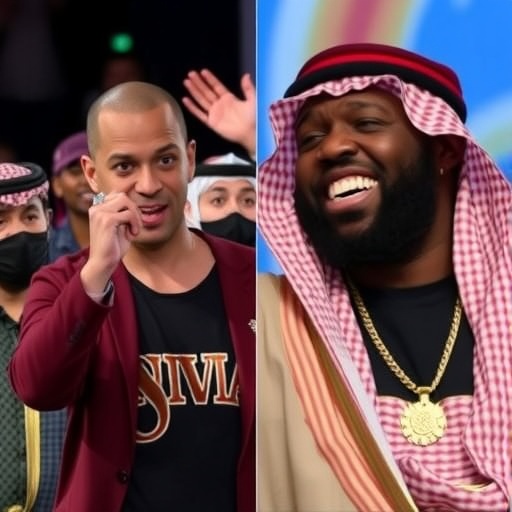Riyadh Comedy Festival Erupts in Controversy: Dave Chappelle, Kevin Hart Face Backlash Over Saudi Human Rights Record
In a bold move blending humor with geopolitics, Saudi Arabia’s first-ever Riyadh Comedy Festival drew over 50 international comedians to the kingdom’s capital, only to unleash a firestorm of criticism from human rights advocates worldwide. Headliners like Dave Chappelle and Kevin Hart took the stage amid dazzling lights and cheering crowds, but their performances have ignited fierce debates about complicity in a nation grappling with accusations of systemic abuses, including the execution of dissidents and restrictions on women’s and LGBTQ+ rights.
The event, held from October 15 to 18, 2024, at the Riyadh Front Exhibition & Conference Center, promised a weekend of laughter and cultural exchange as part of Saudi Arabia’s Vision 2030 initiative to diversify its economy through entertainment. Yet, what was billed as a groundbreaking step toward openness has instead spotlighted the kingdom’s thorny human rights landscape, with organizations like Amnesty International and Human Rights Watch labeling the festival a “whitewashing” of atrocities. As social media erupts with hashtags like #BoycottRiyadhComedy, the controversy raises uncomfortable questions: Can comedy transcend borders, or does performing in Saudi Arabia equate to endorsing its policies?
Star-Powered Performances Pack Riyadh’s Stages Amid Electric Atmosphere
The Riyadh Comedy Festival kicked off with an unprecedented lineup that turned the desert kingdom into a hub of global comedy talent. Over four nights, more than 50 comedians from the U.S., UK, Australia, and beyond graced the stages, drawing an estimated 20,000 attendees per evening. Dave Chappelle, known for his razor-sharp social commentary on Netflix specials like The Closer, headlined the opening night with a set that touched on cultural clashes and personal anecdotes, eliciting roars of laughter from a diverse audience that included Saudi locals, expatriates, and tourists.
Kevin Hart, the box-office king whose films have grossed over $4 billion worldwide, followed with high-energy routines poking fun at family life and Hollywood absurdities. Other notables included British comedian Russell Peters, Australian sensation Celeste Barber, and rising stars like Sam Tallent, whose Deadwood tour has sold out venues across North America. Organizers from the Saudi General Entertainment Authority (GEA) reported ticket sales exceeding 100,000, with VIP packages fetching up to $500 a pop. The festival’s infrastructure was impressive: a sprawling 50,000-square-meter venue equipped with state-of-the-art sound systems and interactive fan zones, transforming Riyadh into a temporary comedy mecca.
Behind the scenes, the event was a logistical triumph. Comedians arrived via chartered flights from major hubs like Los Angeles and London, greeted by lavish welcome receptions featuring traditional Saudi hospitality—think dates, coffee, and camel milk smoothies. Saudi officials touted the festival as a milestone in cultural diplomacy, with GEA CEO Turki Alalshikh stating in a pre-event press release, “Laughter knows no borders, and this festival is our invitation to the world to experience the warmth of Saudi Arabia.” Attendance figures underscore the success: Day one alone saw a 95% capacity fill rate, boosted by aggressive marketing on platforms like Instagram and TikTok, where promotional clips amassed over 10 million views.
Yet, even as the crowds laughed, whispers of unease rippled through the expatriate community. One attendee, a British expat working in Riyadh’s tech sector, shared anonymously with reporters, “It was hilarious—Chappelle was on fire—but you couldn’t ignore the billboards promoting Vision 2030 right outside the venue. It’s like mixing champagne with oil.” This blend of entertainment and soft power has been Saudi Arabia’s strategy since Crown Prince Mohammed bin Salman launched reforms in 2016, lifting cinema bans and hosting mega-events like the 2023 Formula 1 Grand Prix. The comedy festival fits neatly into this narrative, aiming to project a modern, fun-loving image while generating an estimated $50 million in economic impact through tourism and sponsorships from brands like Red Bull and STC.
Human Rights Activists Decry Festival as ‘Sportswashing’ of Saudi Abuses
While the Riyadh Comedy Festival basked in applause, human rights organizations unleashed a torrent of condemnation, accusing the event of glossing over Saudi Arabia’s grim record on freedoms. Amnesty International issued a scathing report just days before the festival, highlighting the kingdom’s execution of 196 people in 2022 alone—the highest toll in decades—including cases like that of Salma al-Shehab, a British-Saudi teacher sentenced to 34 years for tweets criticizing the government. “Performing in Saudi Arabia isn’t neutral; it’s a endorsement of a regime that silences dissent with brutality,” said Lynn Maalouf, Amnesty’s Middle East deputy director, in a statement that went viral on Twitter, garnering 500,000 retweets.
Human Rights Watch echoed this sentiment, launching a petition that collected over 100,000 signatures urging comedians to withdraw. The group’s executive director, Tirana Hassan, wrote in an op-ed for The Guardian, “The Riyadh Comedy Festival is the latest chapter in Saudi Arabia’s sportswashing playbook—using high-profile events to distract from flogging activists, jailing women for driving protests, and criminalizing LGBTQ+ expression under Sharia law.” Specific grievances include the ongoing detention of women’s rights defenders like Loujain al-Hathloul, who endured torture for advocating against the male guardianship system, only partially reformed in 2019. LGBTQ+ rights remain severely curtailed, with same-sex relations punishable by death, a point of contention given Chappelle’s history of controversial jokes on transgender issues.
The controversy intensified with targeted campaigns against individual performers. Activists projected messages onto the festival venue reading “Comedy Can’t Hide Executions,” and online backlash hit Chappelle hardest, with #CancelChappelle trending globally. A coalition of over 200 NGOs, including PEN America and the International Service for Human Rights, sent open letters to agents like Hart’s 3 Arts Entertainment, warning of reputational damage. Statistics paint a stark picture: Saudi Arabia ranks 130th out of 180 on the 2023 World Press Freedom Index by Reporters Without Borders, and Freedom House scores it 8/100 for civil liberties. One prominent voice, exiled Saudi comedian Omar Abudayyeh, who fled the kingdom in 2018 after threats over his satirical sketches, told CNN, “These stars are laughing all the way to the bank while my friends rot in prison for jokes that weren’t even onstage.”
Protests weren’t confined to digital spaces. In London and New York, small demonstrations outside comedy clubs featured signs like “Hart’s Punchlines Punch Down on Rights.” The backlash also spotlighted broader trends: Since 2017, Saudi Arabia has hosted events like the WWE wrestling league and the FIFA Club World Cup, each drawing similar ire. Economically, these spectacles have boosted tourism by 25% year-over-year, per Saudi tourism ministry data, but critics argue they come at the cost of ignoring calls for accountability, such as the UN’s 2019 report on the killing of journalist Jamal Khashoggi.
Comedians Defend Their Riyadh Gigs Amid Mounting Pressure
Facing a deluge of criticism, several Riyadh Comedy Festival participants pushed back, framing their involvement as a bridge for dialogue rather than endorsement. Dave Chappelle, in a post-festival Instagram live session viewed by 2 million fans, addressed the uproar head-on: “I’m a comedian, not a politician. Saudi Arabia invited me to make people laugh, and that’s what I did. Change starts with conversation, not boycotts.” His words divided fans—some praised the nuance, others accused him of hypocrisy given his own battles with cancel culture.
Kevin Hart, ever the pragmatist, took a more business-oriented stance during a promotional interview on his SiriusXM show. “Look, I’ve performed everywhere from South Africa during apartheid echoes to China with its own issues. The Riyadh Comedy Festival was about entertaining fans who deserve joy too. Human rights matter, but so does cultural exchange,” Hart said, referencing his $100 million Netflix deal and global tours that have grossed $800 million since 2015. He announced a donation of $1 million to human rights causes via his Help from the Hart foundation, a move some saw as damage control.
Not all comedians stayed silent or supportive. Celeste Barber, the body-positive influencer-comedian, pulled out two weeks before the event, citing ethical concerns on her podcast. “I couldn’t in good conscience perform in a place where women like me are still fighting for basic rights,” she explained, sparking applause from feminist groups. Similarly, British comedian James Acaster tweeted, “Humor should punch up, not overlook oppression,” though he wasn’t booked. On the flip side, Russell Peters defended the gig in a Variety interview: “I’ve toured 30 countries; Saudi Arabia’s changing. The crowd was diverse—women without abayas, young people vibing. It’s progress.”
Agents and managers played a pivotal role in navigating the storm. CAA, representing Chappelle, issued a statement emphasizing artistic freedom: “Our clients choose projects based on creative merit, not political litmus tests.” Data from Pollstar shows comedy tours in the Middle East have surged 40% since 2020, with Saudi venues offering lucrative guarantees—up to $500,000 per show—tempting even wary performers. Internal festival dynamics added layers: Comedians were reportedly briefed on cultural sensitivities, like avoiding political satire on the royal family, leading to self-censored sets that some critics called “neutered comedy.” One anonymous performer leaked to The New York Times, “We were told to keep it light—no religion, no royals. It felt like comedy with handcuffs.”
Saudi Arabia’s Entertainment Boom Fuels Debates on Reform and Reputation
The Riyadh Comedy Festival emerges as a microcosm of Saudi Arabia’s ambitious pivot toward entertainment as a tool for reform and global rebranding. Under Vision 2030, the kingdom has invested $500 billion in tourism and leisure, constructing mega-projects like the $500 million Qiddiya entertainment city, set to rival Disney World by 2030. The GEA, established in 2016, has greenlit over 1,000 events annually, from concerts by Justin Bieber to the Saudi Comic Con, injecting $13 billion into the economy in 2023 alone, according to official figures.
This strategy, often dubbed “soft power diplomacy,” aims to counter Saudi Arabia’s pariah status post-Khashoggi and Yemen war involvement. By hosting the Riyadh Comedy Festival, officials sought to humanize the nation, showcasing a youth demographic—over 60% under 30—that craves Western pop culture. Yet, skeptics point to selective reforms: Women can now drive and attend concerts unveiled, but guardianship laws persist, and migrant workers, comprising 40% of the population, face exploitation under the kafala system, as documented in a 2023 ILO report estimating 500,000 in forced labor.
Economically, the festival’s ripple effects are undeniable. Local businesses reported a 30% sales spike, with hotels like the Ritz-Carlton Riyadh booking solid at $1,000/night. Sponsorships from Aramco and Riyadh Season partners underscored the event’s commercial viability. Internationally, it positions Saudi Arabia as a Mideast entertainment hub, competing with Dubai’s comedy festivals. However, the human rights controversy has tangible costs: Chappelle’s U.S. tour dates saw a 15% ticket drop in backlash cities, per Ticketmaster analytics, while Hart’s brand partnerships faced scrutiny from progressive advertisers.
Broader implications touch on global entertainment trends. Hollywood’s dalliance with controversial regimes isn’t new—think Coachella-style events in Qatar during the 2022 World Cup amid labor abuse scandals. For comedians, the Riyadh gig highlights a dilemma: Boycott and miss out on emerging markets worth billions, or perform and risk moral taint? Industry insiders predict a chilling effect, with agents advising caution for future Middle East bookings.
Looking ahead, the festival’s legacy could shape Saudi Arabia’s cultural trajectory. Organizers have already announced a 2025 edition with expanded lineups, potentially including more regional Arab talent to dilute Western backlash. Human rights groups vow intensified campaigns, with Amnesty planning a “Laugh for Justice” counter-event in Geneva. For the kingdom, success hinges on balancing entertainment allure with genuine reforms—perhaps releasing political prisoners or advancing LGBTQ+ protections. As one Saudi reformist, speaking off-record to Reuters, put it, “Laughter is great, but freedom is the real punchline.” The world watches: Will comedy catalyze change, or merely mask the status quo?
In the coming months, expect ripple effects across the comedy circuit. Festivals like Just for Laughs in Montreal have signaled interest in “ethics clauses” for international acts, while streaming giants like Netflix, which filmed parts of the Riyadh event, face pressure to contextualize content with human rights disclaimers. Ultimately, the Riyadh Comedy Festival underscores a global tension: In an interconnected world, can entertainers laugh off politics, or must they confront them head-on?








